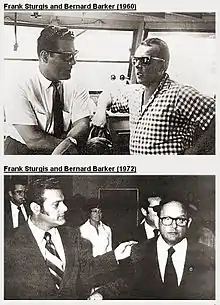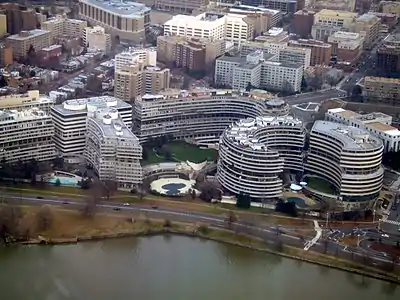Bernard Barker
Bernard Leon Barker (March 17, 1917 – June 5, 2009) was a Watergate burglar and undercover operative in CIA-directed plots to overthrow Cuban leader Fidel Castro.
Bernard Barker | |
|---|---|
 Frank Sturgis and Bernard Barker (r), 1960 (top) and 1972 | |
| Born | Bernard Leon Barker March 17, 1917 |
| Died | June 5, 2009 (aged 92) |
| Nationality | Cuban/American |
| Occupation | military, agent |
| Watergate scandal |
|---|
 |
| Events |
| People |
Early life
Barker was born in Havana, to a Russian American of Jewish descent father[1] and a Cuban mother. Therefore, Barker was a dual citizen of Cuba and the United States.[2] At the age of 16, Barker joined the ABC, a revolutionary group opposed to then president Gerardo Machado Morales. It was during this period that he acquired the nickname "Macho". Worried by these developments, Barker's father sent him to live in the United States. In 1935 Barker became an American citizen, but he returned to Cuba in order to study at the University of Havana.
World War II
After the Japanese attack on Pearl Harbor, triggering American entry into World War II, Barker joined the United States Army Air Forces, where he became a Boeing B-17 Flying Fortress crewman and a Second Lieutenant bombardier. On his thirteenth combat mission, he was shot down on a bombing raid to Brunswick, Germany, February 10, 1944. The Germans held him as a prisoner of war at Stalag Luft I in Barth. The Red Army liberated the camp on May 2, 1945.
Undercover agent
After the war, Barker returned to Cuba and joined the secret police under Fulgencio Batista.[3] He was later recruited by the Federal Bureau of Investigation (FBI) and worked for them as an undercover agent. He also did work for the Central Intelligence Agency (CIA). He joined the 1961 Bay of Pigs invasion.[4]
Joins White House plumbers

In September 1971, his former CIA superior, E. Howard Hunt, recruited him for the "Plumbers", the Nixon White House's "Special Investigations Unit". He was recruited by Hunt to find background information on Daniel Ellsberg. Ellsberg was under watch for leaking the "Pentagon Papers", a series of articles featured in The New York Times in 1971 detailing U.S. government secrets concerning the Vietnam War's history. Along with Hunt and G. Gordon Liddy, Barker broke into the office of Ellsberg's psychiatrist, Dr. Lewis J. Fielding, in Los Angeles. The mission's purpose was to find discrediting information on Ellsberg. The mission was completed, but largely unsuccessful in finding any damaging information about Ellsberg.
In 1972, Barker was one of the five burglars paid by the Committee to Re-elect the President (CRP), Nixon's re-election campaign fundraising committee, for a break-in at the headquarters of the Democratic National Committee, and subsequently was convicted in the Watergate scandal. The others were Frank Sturgis, Virgilio Gonzalez, Eugenio Martinez and James McCord. Along with the other Watergate burglars, G. Gordon Liddy, and E. Howard Hunt, Barker was charged with, and pleaded guilty to, wiretapping, planting electronic surveillance equipment, and theft of documents.
Barker also worked with CRP to get monies which went into the Nixon campaign coffers off the books; it was via his bank account that $25,000 from Archer Daniels Midland Chief Executive Dwayne Andreas was obtained by CRP in violation of campaign finance laws.[5][6]
On March 7, 1974, Barker, along with Ehrlichman, Charles Colson, Liddy, Martinez, and Felipe de Diego, was indicted for the Ellsberg burglary.[7] Barker was released pending appeal after serving one year of a two-and-a-half to six-year sentence.
Later life and death
After Barker's release from prison, he worked as a building inspector for the city of Miami, Florida, earning $18,512 per year. He chose early retirement in 1982 rather than fight proceedings seeking his dismissal for loafing on the job.[8]
President Jimmy Carter denied him a pardon.[9]
Barker died of lung cancer in his Miami home on June 5, 2009, aged 92. His fourth wife, Dora Maria Barker, survived him.
References
- Carlson, Michael (June 7, 2009). "Bernard Barker". The Guardian. Retrieved June 1, 2017.
- "Bernard Barker dies at 92; Watergate burglar was a CIA operative". Los Angeles Times. June 6, 2009. Retrieved 2009-09-08.
- Carlson, Michael (8 June 2009). "Obituary: Bernard Barker". London: The Guardian. Retrieved 2010-04-10.
- "Watergate burglar dies in Florida". BBC. 6 June 2009. Retrieved 2009-09-08.
- Friedman, Thomas L. (January 27, 1989). "Bugged Embassy in Moscow Gets Chance for a New Life". The New York Times. New York, New York. Retrieved 2009-09-08.
- Myers, Steven Lee (April 27, 1992). "Richard E. Gerstein, Dead at 68; Prosecuted Key Watergate Figure". The New York Times. New York, New York. Retrieved 2009-09-08.
- https://news.google.com/newspapers?nid=2002&dat=19740307&id=Bf0qAAAAIBAJ&sjid=c9oFAAAAIBAJ&pg=6800,1496716&hl=en
- "NOTES ON PEOPLE - Bernard Barker to Retire From Miami Job Early - NYTimes.com". 28 January 1982.
-
"Ehrlichman Seeks a Pardon for Watergate Crimes". The New York Times. New York, New York. AP. August 15, 1987. Retrieved 2009-09-08.
Two of the burglars of the Democratic headquarters, Bernard L. Barker and Frank Sturgis, were denied pardons by President Carter.
External links
- Bernard Barker - Daily Telegraph obituary
- Bernard Barker at Find a Grave